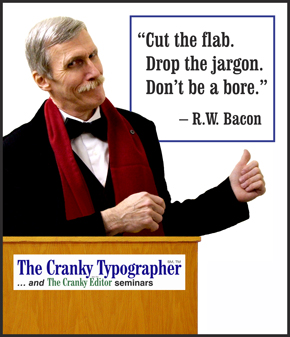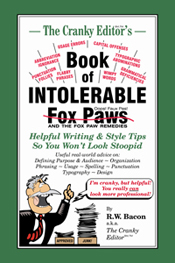The Cranky Editor's Seminar:
Helpful Writing & Style Tips
So You Won't Look Stoopid
is now RETIRED!
The Cranky Editor's Helpful Writing & Style Tips So You Won't Look Stoopid was a self-contained illustrated lecture presentation, with digitally-projected graphics that illustrated the presenter's key points. The program's content was based on The Cranky Editor's Book of Intolerable Fox Paws (Oops! Faux Pas!): Helpful Writing & Style Tips So You Won't Look Stoopid, by veteran journalist, editor, publication designer, and typographer R.W. Bacon.

Topics were presented in the order that the business or organizational writer encounters them in a typical project: Goals, purpose, & organization; wimpy verbs & clumsy sentences; flabby phrases & boring words; dumb usage & spelling errors; ambiguities & oversights; sloppy punctuation; typographic style consistency; typographic, design, & layout blunders; and file preparation for print or the Web. Each attendee received a copy of The Cranky Editor's Book of Intolerable Fox Paws (Oops! Faux Pas!) to reinforce the material covered in the presentation.

Like the book, this seminar was designed for the non-professional writer --- the corporate "draftee," small-business person, solo entrepreneur, or newsletter "editor" --- who was shouldered with the responsibility of churning out marketing materials, newsletters, advertisements, and press releases. Not everyone has equal facility with written language --- there are folks with advanced degrees in marketing communications who can't write a coherent paragraph. But that doesn't mean that a motivated individual with only modest aptitude can't improve the organization of their ideas, streamline the presentation of their words, and clean up usage, spelling, and punctuation errors. This seminar was for those motivated individuals who wanted to improve the quality of the written materials that their business or organization depended upon for success. Therefore this seminar was ideal for small business groups; non-profit volunteer organizations; professional associations; and indeed all who use the written word to communicate on paper or on the web.
The presenter's entertainingly cranky persona, combined with the humorous examples of dull business-speak, flabby phrasing, and clueless usage, ensured that attendees remained awake and alert --- and more importantly, that they could retain and use the information presented.
Helpful Writing & Style Tips So You Won't Look Stoopid
was available in two formats:
The One-Hour Seminar. The compact one-hour program was a tightly-focused "crisis intervention," showing attendees how to identify the most commonly-seen "Fox Paws" (Faux Pas) in their writing, and how to remedy them. This seminar was not intended to open the door to elegant, flowery, or stratospherically-rhapsodic writing. Instead, the seminar dealt with the mundane-but maddening concerns, like where to put the quotation marks, how to make your verbs agree with their subjects, and why even a marginally-educated person should know the difference between burrow and burro. The quick-fixes imparted in this presentation, especially in the area of typographic style consistency --- along with follow-up study with The Cranky Editor's Book of Intolerable Fox Paws (Oops! Faux Pas!) --- helped attendees present their writing in a way that at least looked more credible and convincing, while it awaited further sharpness and polish attained only through study and practice.
The Three-Hour Seminar. The three-hour program extended beyond the "crisis intervention" to explore each category of the Intolerable Fox Paws (Faux Pas) in greater depth. For business or organizational writers who were also "designers-by-default" and who were charged with getting their writing into graphic production, a segment of the presentation was devoted to the basics of functional design, including an introduction to typography, photo editing, and digital file-preparation for printing. For follow-up study, attendees received a copy of The Cranky Editor's Book of Intolerable Fox Paws (Oops! Faux Pas!).

